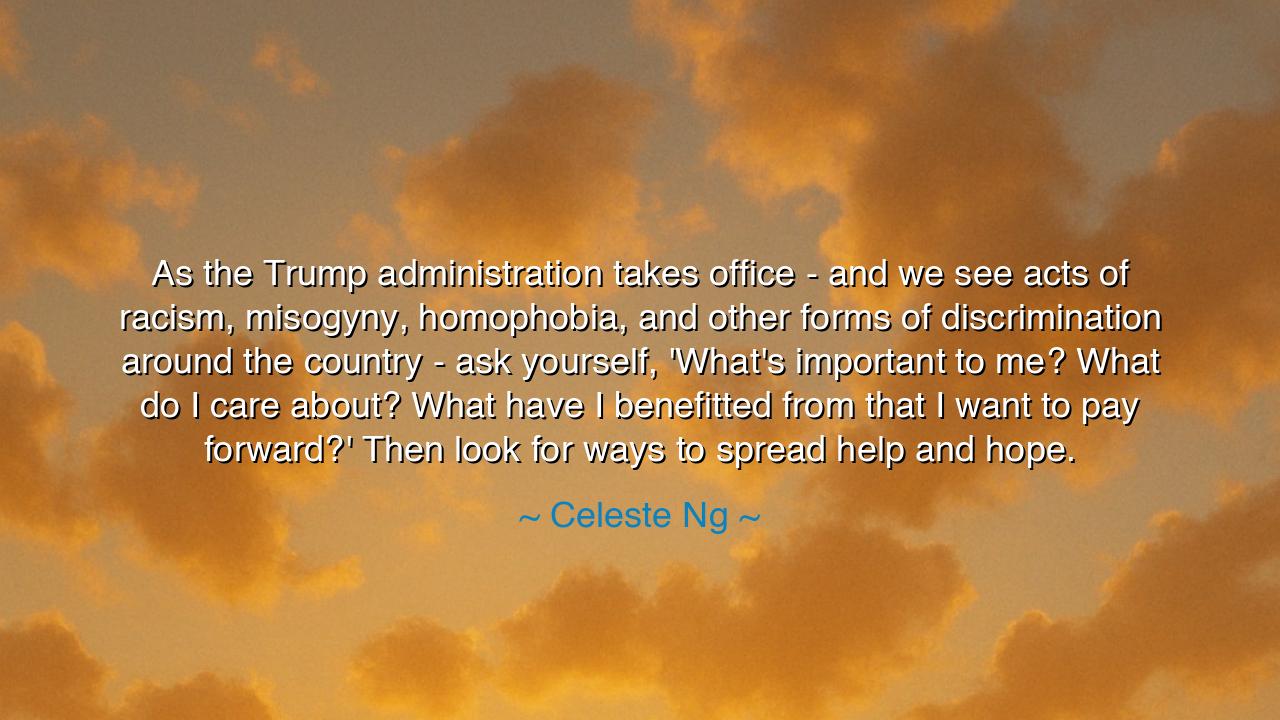
As the Trump administration takes office - and we see acts of
As the Trump administration takes office - and we see acts of racism, misogyny, homophobia, and other forms of discrimination around the country - ask yourself, 'What's important to me? What do I care about? What have I benefitted from that I want to pay forward?' Then look for ways to spread help and hope.






The words of Celeste Ng — “As the Trump administration takes office – and we see acts of racism, misogyny, homophobia, and other forms of discrimination around the country – ask yourself, ‘What’s important to me? What do I care about? What have I benefitted from that I want to pay forward?’ Then look for ways to spread help and hope.” — are not merely the voice of a novelist or citizen, but the voice of the ancient moral conscience that awakens whenever an age darkens with fear and division. Her call is both tender and fierce — a reminder that when the winds of hatred rise, the soul must anchor itself not in despair, but in action, in compassion, and in remembrance of what binds humanity together. Ng’s words reach beyond their political moment to speak an eternal truth: that every generation must decide whether it will be the echo of cruelty or the instrument of kindness.
To understand her meaning, one must see the time in which these words were born. The Trump administration, ascending amid storms of anger and division, marked a moment when America wrestled with its reflection — when deep-seated racism, misogyny, and fear of the other resurfaced like shadows from a long-forgotten past. Yet Ng did not respond with bitterness or retreat. Instead, she asked the oldest question known to the human heart: “What is my responsibility in the face of injustice?” Her words echo the teachings of the ancients — that in times of turmoil, the measure of one’s soul is not found in comfort, but in courage. For when power stirs division, only the ordinary acts of compassion from countless hearts can restore balance to the world.
This wisdom is as old as civilization itself. In ancient Rome, when tyranny sought to silence the voices of conscience, Marcus Aurelius wrote in his meditations that a person’s task is not to control the world, but to “live according to virtue” within it. The Stoics taught that one cannot command the storms, but one can choose how to stand within them. So too does Ng’s teaching remind us that even in a time of cruelty, the individual still possesses divine power — the power to choose decency, to act with love, to protect the vulnerable. One person may not change a government, but one person can change the life beside them — and from such sparks, whole fires of renewal are born.
History bears witness to this truth. In the years of Nazi occupation, when hatred ruled from above, simple citizens of Denmark — bakers, fishermen, mothers, and priests — refused to yield to cruelty. They hid their Jewish neighbors, ferried them across dark waters to safety, and in doing so, preserved the light of humanity in one of its darkest nights. They did not ask whether they could stop the war; they asked what good they could do in the moment that stood before them. This is the living essence of Ng’s message: that hope is not an idea, but a deed — an act of courage repeated, quietly, until it becomes the song of an age.
To “pay forward” the good we have received is to recognize that none of us lives by our own strength alone. Every kindness, every freedom, every opportunity is the inheritance of someone else’s generosity — the work of those who came before us, who gave when it was costly, who believed when it was easier to despair. Ng’s question, “What have I benefitted from that I want to pay forward?” is not one of guilt, but of gratitude. It calls us to become stewards of the blessings we have inherited, to transform privilege into service, and to let empathy be the bridge between comfort and compassion.
And when she says, “Look for ways to spread help and hope,” she is not speaking of grand gestures, but of the quiet heroism of daily goodness — the courage to listen, to speak truth gently, to defend the dignity of another. Hope, in her vision, is not naïve optimism but active resistance to despair. It is the same strength that moved Dr. Martin Luther King Jr. to say that “darkness cannot drive out darkness; only light can do that.” Hope is the seed from which justice grows, and help is the rain that nourishes it.
Thus, let the lesson of Celeste Ng’s words be carried into the hearts of all who hear them: when hatred rises, do not meet it with silence; when fear divides, answer with compassion; when apathy tempts you to withdraw, remember that even the smallest act of love ripples across eternity. Ask yourself daily, “What is important to me? What can I give?” — and then give it. For to act from the heart, even in a time of turmoil, is to participate in the timeless labor of creation — the rebuilding of a more humane world.
And when history looks back upon our days, let it not say that we turned away in comfort while others suffered, but that we, like the ancients and the wise before us, chose to spread help and hope — and in doing so, kept the light of humanity burning, even in the storm.






AAdministratorAdministrator
Welcome, honored guests. Please leave a comment, we will respond soon